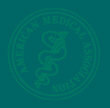
Medical
Schools ![]() About the
Section
About the
Section ![]() Issues/Advocacy
Issues/Advocacy ![]() Section
News
Section
News ![]() LCME Web Page
LCME Web Page ![]() Comments/
Comments/ ![]() Feedback
Feedback

Why Academic Physicians Should Join The AMA
Our
American Medical Association (AMA) does more to improve the practice of
medicine in this country than any other medical association. Our AMA is
deeply committed to quality patient care and quality medical education. It
maintains rigorous standards of ethical professional conduct to guide
physicians in making patient care decisions and ensures the high quality
of medical education in this country through its accreditation
programs.
Ensuring the Quality of Medical
Education
The American Medical Association was founded with
the goal of improving the condition of medical education in the United
States. Through the years, the AMA has served as a leader in ensuring that
there are high standards for medical education across the continuum. For
example, when Medicare reform efforts in the 104th congress threatened to
slash funding in graduate medical education, the AMA's grassroots efforts
helped convince Representatives that deep cuts would threaten quality
health education and ultimately patient care. The AMA continues to call
for full reimbursement to teaching hospitals for the reasonable costs of
residents' salaries and fringe benefits. Because vitally-needed changes in
our system of funding graduate medical education are needed, AMA's
proposal to transform Medicare includes a plan to restructure the funding
of GME and sustain our nation's teaching hospitals.
Serving as an Advocate for Medical Education
The AMA has a
strong advocacy voice in Washington and in the states and has used its
resources to address issues of importance to academic physicians. For
example, the AMA has objected strongly to the standards being applied in
the nationwide PATH audits being conducted by the HHS Office of Inspector
General (OIG). The retroactive application of regulations is grossly
unfair and threatens to cripple our nation's medical schools, teaching
hospital and faculty practice plans. The AMA is prepared to pursue all
remedies, including litigation, to ensure that PATH audits be conducted in
a manner consistent with the law in effect at the time the audited claims
were filed.
The AMA continues to explore the impact of managed care on academic medical centers and has called for managed care providers to play an active role in financing and facilitating residency programs.
Pursuing the Development of Rational Medical Education
Policy
There is a growing concern that there will soon be an
oversupply of physicians in the United States and that will not be in the
best interest of the nation. Any legislative proposal to reform physician
workforce will have far-reaching impact on the future of medical education
and academic medical centers. In conjunction with five other major
national medical association our AMA has recommended a strong response to
the growing problem of physician oversupply.
Supporting Individual Medical Schools
Since it was
founded in 1956, the American Medical Association Education and Research
Foundation (AMA-ERF) has distributed over $64 million to medical schools.
These funds are used to provide financial assistance to medical schools
and to assist schools in program development.
